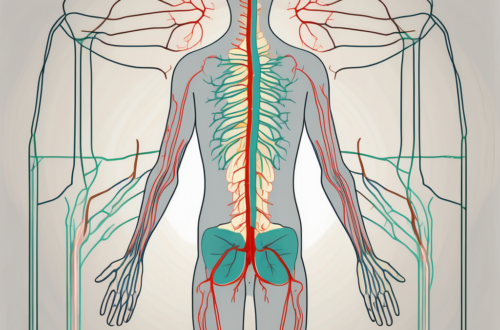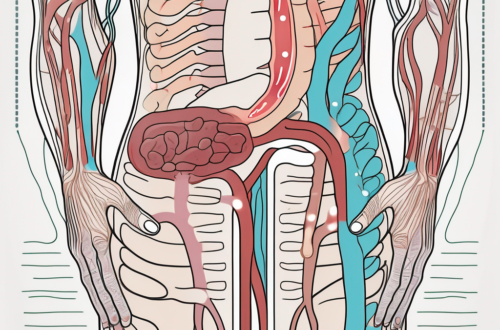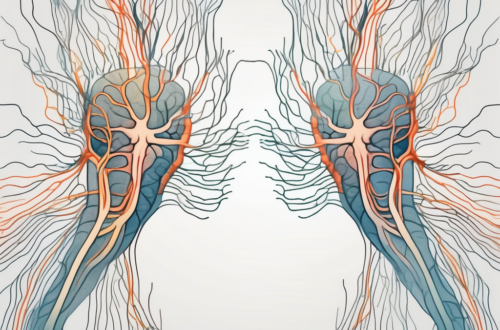The vagus nerve is a complex and fascinating part of the human nervous system. As one of the twelve cranial nerves, it plays a crucial role in regulating various bodily functions. Specifically, the parasympathetic nerve fibers of the vagus nerve are responsible for controlling the body’s rest and digest response. In this article, we will explore the intricacies of the vagus nerve and delve into the world of parasympathetic nerve fibers.
An Overview of the Vagus Nerve
The vagus nerve, also known as cranial nerve X, is the longest and most complex of the cranial nerves. It originates in the brainstem and travels through the neck, chest, and abdomen, innervating various organs along its path. This nerve is divided into two branches: the sensory and motor branches. While the sensory branch conveys information from the body to the brain, the motor branch is responsible for sending signals from the brain to the body.
The Role and Function of the Vagus Nerve
The vagus nerve plays a crucial role in the regulation of many bodily functions. It is primarily associated with the parasympathetic nervous system, which controls the body’s rest and digest response. When activated, the vagus nerve promotes relaxation and facilitates digestion by stimulating the production of stomach acids and digestive enzymes. It also helps regulate heart rate and blood pressure by decreasing both in times of relaxation.
But the vagus nerve’s influence extends beyond digestion and cardiovascular function. It also has an impact on our emotional well-being. Research has shown that the vagus nerve is involved in the regulation of emotions and plays a role in the body’s stress response. When the vagus nerve is activated, it can help reduce feelings of anxiety and promote a sense of calm and well-being.
Furthermore, the vagus nerve is involved in the body’s immune response. It has been found to play a role in reducing inflammation and promoting healing. Activation of the vagus nerve can help regulate the immune system, making it an important player in maintaining overall health and well-being.
Anatomy of the Vagus Nerve
The vagus nerve is composed of thousands of individual nerve fibers that work together to transmit electrical signals. These fibers are categorized into various types, including parasympathetic, sympathetic, and afferent fibers. However, it is the parasympathetic nerve fibers that are of particular interest when it comes to understanding the vagus nerve’s impact on the body’s functions.
Within the parasympathetic nerve fibers, there are different pathways that the vagus nerve takes to reach its target organs. For example, the vagus nerve innervates the heart through the cardiac plexus, a network of nerves located near the heart. This allows the vagus nerve to directly influence heart rate and cardiac function.
In addition to the heart, the vagus nerve also innervates other organs such as the lungs, liver, and intestines. It forms connections with these organs, allowing for the transmission of signals that regulate their function. This intricate network of connections highlights the complexity and importance of the vagus nerve in maintaining the body’s homeostasis.
Overall, the vagus nerve is a fascinating and essential component of the nervous system. Its extensive reach and diverse functions make it a vital player in regulating various bodily processes. Understanding the intricacies of the vagus nerve can provide valuable insights into the body’s overall health and well-being.
Delving into Parasympathetic Nerve Fibers
Parasympathetic nerve fibers are a subset of the vagus nerve that control the body’s rest and digest response. These fibers originate from the brainstem and innervate various organs, including the heart, lungs, stomach, and intestines. When activated, they promote rest, relaxation, and optimal digestion.
Let’s take a closer look at the fascinating world of parasympathetic nerve fibers and explore their role in maintaining the body’s equilibrium.
Defining Parasympathetic Nerve Fibers
Parasympathetic nerve fibers are part of the autonomic nervous system and work in opposition to the sympathetic nervous system. While the sympathetic system is responsible for the fight or flight response, the parasympathetic system, mediated by the vagus nerve, counters this response by promoting relaxation and digestion.
These nerve fibers play a crucial role in maintaining homeostasis, ensuring that the body’s internal environment remains stable and balanced. They are responsible for regulating various bodily functions, such as heart rate, respiratory rate, and gastrointestinal motility.
The Connection between the Vagus Nerve and Parasympathetic Nerve Fibers
The parasympathetic nerve fibers of the vagus nerve originate in the brainstem and travel to various organs in the body. These fibers release neurotransmitters, such as acetylcholine, to stimulate the target organs and promote restful states.
The vagus nerve acts as a communication highway, allowing the brain to regulate various bodily functions through the activation of parasympathetic nerve fibers. It sends signals from the brain to the heart, lungs, stomach, and intestines, coordinating their activities and ensuring their proper functioning.
When we are in a relaxed state, the parasympathetic nerve fibers are active, promoting digestion and allowing the body to rest and recover. They slow down the heart rate, increase gastrointestinal motility, and stimulate the release of digestive enzymes.
Interestingly, recent research has shown that the vagus nerve and parasympathetic nerve fibers also play a role in modulating inflammation and immune responses. Activation of these fibers has been found to have anti-inflammatory effects, promoting healing and reducing the risk of chronic diseases.
In conclusion, parasympathetic nerve fibers, mediated by the vagus nerve, are essential for maintaining the body’s rest and digest response. They promote relaxation, optimal digestion, and overall well-being. Understanding the intricate workings of these nerve fibers provides valuable insights into the complex mechanisms that govern our physiological processes.
The Impact of Vagus Nerve on Body Functions
The vagus nerve, also known as the tenth cranial nerve, is the longest and most complex of the cranial nerves. It originates in the brainstem and extends down to various organs in the body, including the heart and the digestive system. Through its parasympathetic nerve fibers, the vagus nerve exerts a profound influence on the body’s functions, playing a crucial role in maintaining homeostasis and overall well-being.
Vagus Nerve and the Heart
The vagus nerve provides extensive innervation to the heart, making it a key player in regulating heart rate and rhythm. Stimulation of the vagus nerve by the parasympathetic fibers slows down the heart rate, promoting a state of rest and decreasing blood pressure. This is why techniques such as deep breathing and meditation, which stimulate the vagus nerve, are often recommended for relaxation and stress reduction.
Furthermore, the vagus nerve acts as a powerful modulator of the autonomic nervous system, which controls involuntary bodily functions. It helps maintain a delicate balance between the sympathetic and parasympathetic systems, ensuring that the heart functions optimally in response to various physiological demands.
Vagus Nerve and the Digestive System
The parasympathetic nerve fibers of the vagus nerve also exert significant control over the digestive system. When activated, these fibers stimulate the secretion of digestive enzymes, increase blood flow to the digestive organs, and enhance intestinal motility. This coordinated response ensures efficient nutrient absorption and optimal digestion.
Moreover, the vagus nerve plays a crucial role in the gut-brain axis, a bidirectional communication system between the gut and the brain. It transmits information about the state of the digestive system to the brain, influencing feelings of hunger, satiety, and overall gastrointestinal well-being. Dysfunction of the vagus nerve can lead to digestive disorders such as gastroparesis, where the stomach takes longer to empty its contents, causing symptoms like nausea and bloating.
Interestingly, recent research has also uncovered the potential role of the vagus nerve in modulating the gut microbiota, the trillions of microorganisms that reside in the gastrointestinal tract. The vagus nerve may influence the composition and diversity of the gut microbiota, which in turn can impact various aspects of health, including metabolism, immune function, and mental well-being.
Overall, the vagus nerve is a fascinating and intricate component of the nervous system, with its far-reaching effects on the heart and digestive system. Its proper functioning is essential for maintaining optimal physiological balance and overall health. Understanding the intricate mechanisms by which the vagus nerve influences body functions opens up exciting possibilities for therapeutic interventions and the promotion of well-being.
Disorders Related to the Vagus Nerve
While the vagus nerve is an incredibly important part of the human body, dysfunction or damage to this nerve can lead to various disorders.
The vagus nerve, also known as the tenth cranial nerve, is the longest cranial nerve in the body. It plays a vital role in regulating many essential bodily functions, including heart rate, digestion, and speech. However, when this nerve malfunctions or sustains damage, it can result in a range of disorders that can significantly impact a person’s quality of life.
One common disorder related to the vagus nerve is known as vagus nerve neuropathy. This condition occurs when the nerve becomes compressed or damaged, leading to a disruption in its normal functioning. Symptoms of vagus nerve neuropathy can vary widely, depending on the location and severity of the nerve damage.
Symptoms of Vagus Nerve Disorders
Vagus nerve disorders can present with a wide range of symptoms, including irregular heart rate, digestive issues, difficulty swallowing, and vocal cord paralysis. These symptoms can be distressing and can significantly affect a person’s daily activities and overall well-being.
Irregular heart rate, also known as arrhythmia, is a common symptom of vagus nerve disorders. The vagus nerve helps regulate the heart’s electrical activity, and when it malfunctions, it can result in an irregular heartbeat. This can lead to palpitations, dizziness, and even fainting in some cases.
In addition to heart-related symptoms, vagus nerve disorders can also manifest as digestive issues. The vagus nerve plays a crucial role in controlling the movement of food through the digestive tract and the secretion of digestive enzymes. When the nerve is damaged, it can lead to problems such as bloating, constipation, and difficulty swallowing.
Another symptom of vagus nerve disorders is vocal cord paralysis. The vagus nerve innervates the muscles responsible for vocal cord movement, and when it is affected, it can result in hoarseness, weak voice, or even complete loss of voice.
It is important to note that these symptoms can be indicative of other underlying medical conditions as well. Therefore, it is crucial to consult with a healthcare professional for an accurate diagnosis and appropriate treatment options.
Treatment and Management of Vagus Nerve Disorders
The treatment and management of vagus nerve disorders depend on the underlying cause and severity of the condition. In many cases, addressing the underlying condition or managing the symptoms through lifestyle modifications may be sufficient.
Lifestyle modifications can include stress management techniques, such as meditation or yoga, which can help regulate the autonomic nervous system and promote vagus nerve health. Additionally, dietary changes, such as consuming foods rich in omega-3 fatty acids and antioxidants, can have a positive impact on nerve function.
However, in more severe cases, medical interventions such as medication or surgical procedures may be recommended. Medications may be prescribed to manage specific symptoms, such as antiarrhythmic drugs for irregular heart rate or medications to improve digestive motility.
In cases where the vagus nerve damage is extensive or irreversible, surgical interventions may be necessary. Surgical procedures, such as vagus nerve stimulation, can help restore normal nerve function or bypass the damaged portion of the nerve.
It is important to work closely with a healthcare professional to determine the most appropriate treatment approach for individual cases. They can provide guidance and support throughout the treatment process, ensuring the best possible outcome for patients with vagus nerve disorders.
The Future of Vagus Nerve Research
The study of the vagus nerve and its parasympathetic nerve fibers continues to advance, shedding light on new potential therapeutic applications and uncovering deeper insights into its complex functions.
The vagus nerve, also known as the “wandering nerve,” is the longest cranial nerve in the body. It originates in the brainstem and extends down to various organs, including the heart, lungs, and digestive system. Its primary function is to regulate the parasympathetic nervous system, which is responsible for the body’s rest and digest response.
Researchers are exploring various therapeutic applications of vagus nerve stimulation, including its potential role in treating epilepsy, depression, and inflammatory conditions. By stimulating the vagus nerve, scientists believe they can modulate the activity of different organs and systems, leading to potential therapeutic benefits. Although these areas of research show promise, it is crucial to note that further studies are required to fully elucidate the safety and efficacy of these approaches.
Potential Therapeutic Applications
Vagus nerve stimulation has shown promising results in the treatment of epilepsy. By delivering electrical impulses to the nerve, researchers have observed a reduction in seizure frequency and severity in some patients. This non-invasive approach offers hope for individuals who do not respond well to traditional anti-seizure medications.
In the field of mental health, vagus nerve stimulation is being investigated as a potential treatment for depression. Studies have shown that stimulating the vagus nerve can increase the release of neurotransmitters such as serotonin and norepinephrine, which are known to play a role in mood regulation. This novel approach offers an alternative for individuals who do not experience relief from antidepressant medications.
Furthermore, researchers are exploring the anti-inflammatory effects of vagus nerve stimulation. Inflammatory conditions, such as rheumatoid arthritis and Crohn’s disease, involve an overactive immune response. By modulating the activity of the vagus nerve, scientists hope to dampen the inflammatory response and alleviate symptoms in affected individuals.
Unanswered Questions in Vagus Nerve Research
Despite significant advancements in vagus nerve research, there are still many unanswered questions. Scientists are actively working to understand the precise mechanisms by which the vagus nerve influences different bodily functions and exploring novel ways to target specific pathways for therapeutic purposes.
One area of ongoing research is the role of the vagus nerve in regulating heart rate variability. Heart rate variability refers to the variation in the time interval between heartbeats and is considered a marker of autonomic nervous system function. By unraveling the intricate connections between the vagus nerve and the heart, researchers hope to develop targeted interventions for cardiovascular conditions.
Another unanswered question revolves around the potential link between the vagus nerve and gut health. Emerging evidence suggests that the vagus nerve plays a crucial role in the gut-brain axis, a bidirectional communication system between the gut and the brain. Understanding this connection could lead to innovative treatments for gastrointestinal disorders, such as irritable bowel syndrome and inflammatory bowel disease.
The ongoing research in this area holds great potential for improving our understanding of the nervous system and developing innovative treatments for a wide range of conditions. As scientists continue to delve into the complexities of the vagus nerve, new discoveries are expected to emerge, paving the way for future advancements in medical science.
In conclusion, understanding the parasympathetic nerve fibers of the vagus nerve provides a glimpse into the intricate web of connections within the human body. By recognizing the vital role that the vagus nerve plays in regulating our rest and digest response, we can appreciate the significance of maintaining its health. Despite the ongoing advancements in vagus nerve research, it is essential to consult with a healthcare professional for medical advice and guidance tailored to individual needs.





